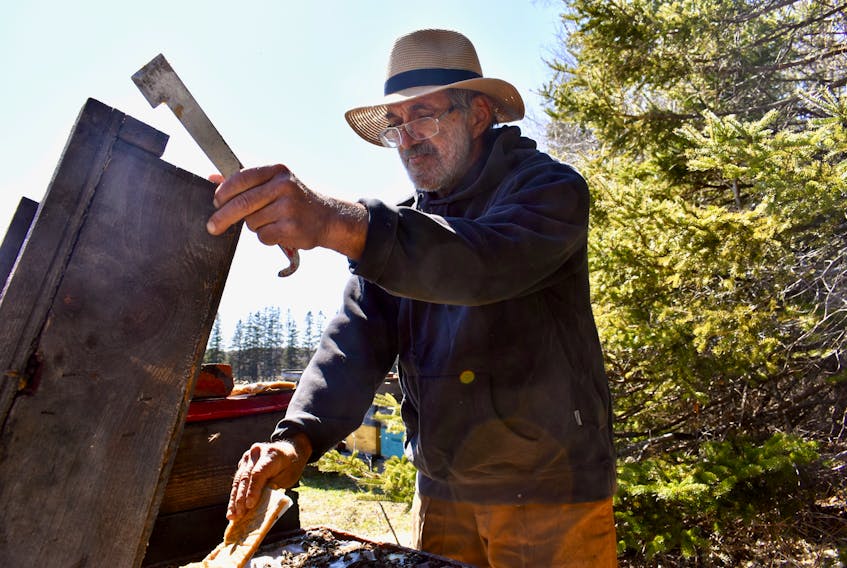Stan Sandler is worried about bees.
A beekeeper for 40 years, Sandler is concerned the importation of beehives from outside the province could put Island hives in danger from the invasive small hive beetle.
Though the beetle hasn’t been found in P.E.I., it’s only a matter of time as blueberry growers continue to import hives for pollination, said Sandler.
“It doesn’t make any sense to be bringing in hives from Ontario that are going to infect us with another pest. It’s hard enough to keep bees.”
In his efforts to protect Island bees, Sandler created a petition on Change.org asking Premier Dennis King to re-evaluate the inspection procedure and follow through on a promises King made during the all-party leaders environmental forum on April 8, 2019, for a 100 per cent inspection rate. As of May 18, it has 725 signatures.
Sandler also attempted to enact changes by taking the province to court, though he recently lost his request for a judicial review.

The danger
The small hive beetle consumes almost everything in a hive, from the honey to the wax honeycomb frames and, in the process, ferments or “slimes” the honey, making it inedible to bees and humans.
There’s even a risk to empty wax combs kept in storage. If that happened, Sandler could lose nearly 10,000 frames, he said.
“Worst case scenario is that it could get into a beekeeper’s premises and ruin his honey crop and destroy his equipment. He would basically be, unless he had a lot of funds, out of business.”
Inspection protocols
- Inspection of a minimum of 10 per cent of hives (or a minimum of 10, whichever is greater) from each apiary by a local provincial inspector for a permit to be granted.
- If there is any evidence of small hive beetle, no hives from the apiary would be permitted.
- Once in P.E.I., they will be inspected again, though the policy doesn't specify how many or what percentage.
- If found to have small hive beetles, they would be destroyed.
Derek van den Heuvel, who runs his own beekeeping operation with around 350 hives, worries that without a significant investment, his entire operation is in danger if the beetles find their way here.
“For my operation to be comfortable that I’m not going to have any losses from hive beetle, I need to put up a facility that’s going to cost me about $150,000 to secure my honey.”

Other options available
While honeybees typically perform the best, there are other options out there for blueberry growers, said van den Heuvel
“They can use bumblebees that have been raised in a secure facility, so they know they are beetle free, and they can also use another pollinator called the leaf cutter.”
Sandler agrees bumblebees are a viable option as well, but he would still prefer to see an end to importations, like Nova Scotia has done.
In an email response to the Guardian, Cameron Menzies, the province’s apiarist, said, “the P.E.I. government is open to following suit with Nova Scotia once our pollination industry is self-sufficient”.
But to make the Island self-sufficient would require a doubling of the honeybee populations and huge investments to grow operations here, something many beekeepers are reluctant to do, said van den Houven.
“We don’t want to invest in an industry that is going to become contaminated with small hive beetles simply because once ... infested with small hive beetle we would have to spend a lot of money on our honey facilities to keep our honey crops safe.”
Contingency plan
The government also has a plan in place in the event the beetles are found on the Island, which includes quarantine procedures and an eradication method using diesel fuel in infected hives to kill the bees, then burning the entire hive to eliminate the pest.









